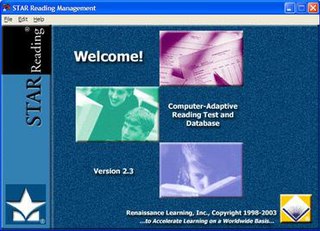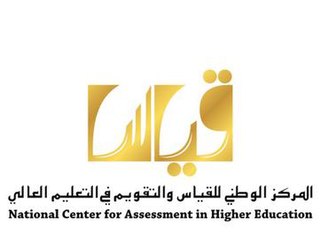Related Research Articles

A standardized test is a test that is administered and scored in a consistent, or "standard", manner. Standardized tests are designed in such a way that the questions and interpretations are consistent and are administered and scored in a predetermined, standard manner.

English as a second or foreign language refers to the use of English by individuals whose native language is different, commonly among students learning to speak and write English. Variably known as English as a foreign language (EFL), English as a second language (ESL), English for speakers of other languages (ESOL), English as an additional language (EAL), or English as a new language (ENL), these terms denote the study of English in environments where it is not the dominant language. Programs such as ESL are designed as academic courses to instruct non-native speakers in English proficiency, encompassing both learning in English-speaking nations and abroad.
Educational assessment or educational evaluation is the systematic process of documenting and using empirical data on the knowledge, skill, attitudes, aptitude and beliefs to refine programs and improve student learning. Assessment data can be obtained by examining student work directly to assess the achievement of learning outcomes or it is based on data from which one can make inferences about learning. Assessment is often used interchangeably with test but is not limited to tests. Assessment can focus on the individual learner, the learning community, a course, an academic program, the institution, or the educational system as a whole. The word "assessment" came into use in an educational context after the Second World War.

The No Child Left Behind Act of 2001 (NCLB) was a U.S. Act of Congress promoted by the presidency of George W. Bush. It reauthorized the Elementary and Secondary Education Act and included Title I provisions applying to disadvantaged students. It mandated standards-based education reform based on the premise that setting high standards and establishing measurable goals could improve individual outcomes in education. To receive federal school funding, states had to create and give assessments to all students at select grade levels.

The College Board, styled as CollegeBoard, is an American not-for-profit organization that was formed in December 1899 as the College Entrance Examination Board (CEEB) to expand access to higher education. While the College Board is not an association of colleges, it runs a membership association of institutions, including over 6,000 schools, colleges, universities, and other educational organizations.

Language immersion, or simply immersion, is a technique used in bilingual language education in which two languages are used for instruction in a variety of topics, including maths, science, or social studies. The languages used for instruction are referred to as the L1 and the L2 for each student, with L1 being the student's native language and L2 being the second language to be acquired through immersion programs and techniques. There are different types of language immersion that depend on the age of the students, the classtime spent in L2, the subjects that are taught, and the level of participation by the speakers of L1.
The Massachusetts Comprehensive Assessment system, commonly abbreviated as MCAS, is Massachusetts's statewide standards-based assessment program developed in 1993 in response to the Massachusetts Education Reform Act of the same year. State and federal law mandates that all students who are enrolled in the tested grades and who are educated with Massachusetts public funds participate in MCAS testing.
The Ohio Graduation Test (OGT) is the high school graduation examination given to sophomores in the U.S. state of Ohio. Students must pass all five sections (reading, writing, mathematics, science and social studies) in order to graduate. Students have multiple chances to pass these sections and can still graduate without passing each using the alternative pathway. In 2009, the Ohio legislature passed an education reform bill eliminating the OGT in favor of a new assessment system. The development and transition of replacement began in 2014 and ended in 2022.

STAR Reading, STAR Early Literacy and STAR Math are standardized, computer-adaptive assessments created by Renaissance Learning, Inc., for use in K–12 education. Each is a "Tier 2" assessment of a skill (reading practice, math practice, and early literacy, respectively that can be used any number of times due to item-bank technology. These assessments fall somewhere between progress monitoring tools and high-stakes tests.
The Stanford Achievement Test Series, the most recent version of which is usually referred to simply as the "Stanford 10" or SAT-10, is a set of standardized achievement tests used by school districts in the United States and in American schools abroad for assessing children from kindergarten through high school. Millions of students have taken the test each year. First published in 1922, the test is now in its tenth version. It is produced by the publishing company Harcourt, and should not be confused with the SAT college admission test published by the College Board. Although in many states it is being replaced by state-created tests, it is not equivalent to most of these tests in that the Stanford series are more comprehensive in scope than the newer assessments. The test is available in 13 levels that roughly correspond to the year in school, but the correspondence is not exact. Each level of the test is broken into subtests or strands covering various subjects such as reading comprehension, mathematics problem-solving, language, spelling, listening comprehension, science, and social science.
In an educational setting, standards-based assessment is assessment that relies on the evaluation of student understanding with respect to agreed-upon standards, also known as "outcomes". The standards set the criteria for the successful demonstration of the understanding of a concept or skill.
The National Center for Fair & Open Testing, also known as FairTest, is an American educational policy organization that opposes standardized testing and their use in university admission.
Education in Jamaica is primarily modeled on the British education system.
Language assessment or language testing is a field of study under the umbrella of applied linguistics. Its main focus is the assessment of first, second or other language in the school, college, or university context; assessment of language use in the workplace; and assessment of language in the immigration, citizenship, and asylum contexts. The assessment may include listening, speaking, reading, writing, an integration of two or more of these skills, or other constructs of language ability. Equal weight may be placed on knowledge and proficiency, or greater weight may be given to one aspect or the other.

The ICFESexamination, or Saber 11, is a high school exit examination administered annually in grade 11 in Colombian high schools. The exam is standardized, similar to the SAT and ACT examinations taken by high school students in the United States. The purpose of the exam is to evaluate students' aptitude in five subjects: critical reading, mathematics, social studies, science, and English. Each exam question has four multiple-choice answers, except for the English section which provides between three and eight possible answers for each question.
The American Association of Teachers of Spanish and Portuguese is a language-specific professional association in the United States that was founded on December 29, 1917, in New York City as the American Association of Teachers of Spanish. The name was changed to the present one when Portuguese was added to the association's mission in 1944.

An examination or test is an educational assessment intended to measure a test-taker's knowledge, skill, aptitude, physical fitness, or classification in many other topics. A test may be administered verbally, on paper, on a computer, or in a predetermined area that requires a test taker to demonstrate or perform a set of skills.

Measurement is derived from the verb 'to measure' which means to assess something; in Arabic 'yaqees' 'measure' has the meaning of comparing something to something else. In this sense, measurement is a daily practice that manifests itself in all our assessment activities, whether we assess concrete things in terms of size and color, or abstract things such as human relations. The ultimate goal of 'measuring' something is to assess ourselves in comparison to everything else in the world.
References
- 1 2 "What is the NSE?". www.nationalspanishexam.org.
- ↑ "WELCOME TO THE AATSP". www.aatsp.org. Retrieved May 22, 2021.
- ↑ "Prizes". National Spanish Examinations. Retrieved 13 March 2017.